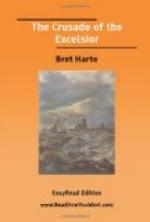Left to himself, Hurlstone barely glanced at the memorandum, which seemed to be the rough minutes of some society. He believed Perkins; but was it possible that the Padre could be ignorant of the designs of his fellow-councilors? And if he were not—if he had long before been in complicity with them for the removal of Eleanor, might he not also have duped him, Hurlstone, and sent him on this mission as a mere blind; and—more infamously—perhaps even thus decoyed him on board the wrong ship? No—it was impossible! His honest blood quickly flew to his cheek at that momentary disloyal suspicion.
Nevertheless, the Senor’s bland revelations filled him with vague uneasiness. She was safe with her brother now; but what if he and the other Americans were engaged in this ridiculous conspiracy, this pot-house rebellion that Father Esteban had spoken of, and which he had always treated with such contempt? It seemed strange that Perkins had said nothing of the arrival of the relieving party from the Gulf, and its probable effect on the malcontents. Did he know it? or was the news now being brought by this messenger whom he, Hurlstone, had supplanted? If so, when and how had Perkins received the intelligence that brought him to Todos Santos? The young man could scarcely repress a bitter smile as he remembered the accepted idea of Todos Santos’ inviolability—that inaccessible port that had within six weeks secretly summoned Perkins to its assistance! And it was there he believed himself secure! What security had he at all? Might not this strange, unimpassioned, omniscient man already know his secret as he had known the others’?
The interview of Perkins with the messenger in the next cabin was a long one, and apparently a stormy one on the part of the newcomer. Hurlstone could hear his excited foreign voice, shrill with the small vehemence of a shallow character; but there was no change in the slow, measured tones of the Senor. He listlessly began to turn over the papers on the table. Presently he paused. He had taken up a sheet of paper on which Senor Perkins had evidently been essaying some composition in verse. It seemed to have been of a lugubrious character. The titular line at the top of the page, “Dirge,” had been crossed out for the substituted “In Memoriam.” He read carelessly:
“O Muse unmet—but
not unwept—
I seek thy
sacred haunt in vain.
Too late, alas! the
tryst is kept—
We may not
meet again!
“I sought thee
’midst the orange bloom,
To find
that thou hadst grasped the palm
Of martyr, and the silent
tomb
Had hid
thee in its calm.
“By fever racked,
thou languishest
On Nicaragua’s”—
Hurlstone threw the paper aside. Although he had not forgotten the Senor’s reputation for sentimental extravagance, and on another occasion might have laughed at it, there was something so monstrous in this hysterical, morbid composition of the man who was even then contemplating bloodshed and crime, that he was disgusted. Like most sentimental egotists, Hurlstone was exceedingly intolerant of that quality in others, and he turned for relief to his own thoughts of Eleanor Keene and his own unfortunate passion. He could not have written poetry at such a moment!




